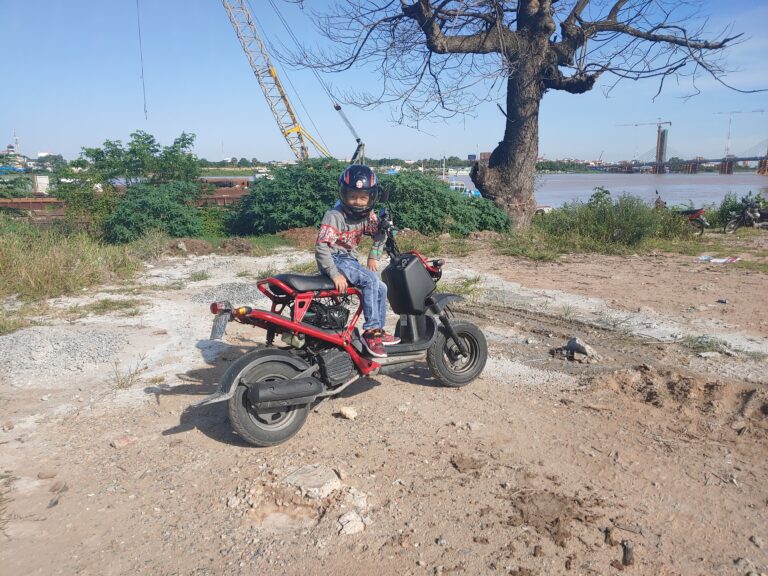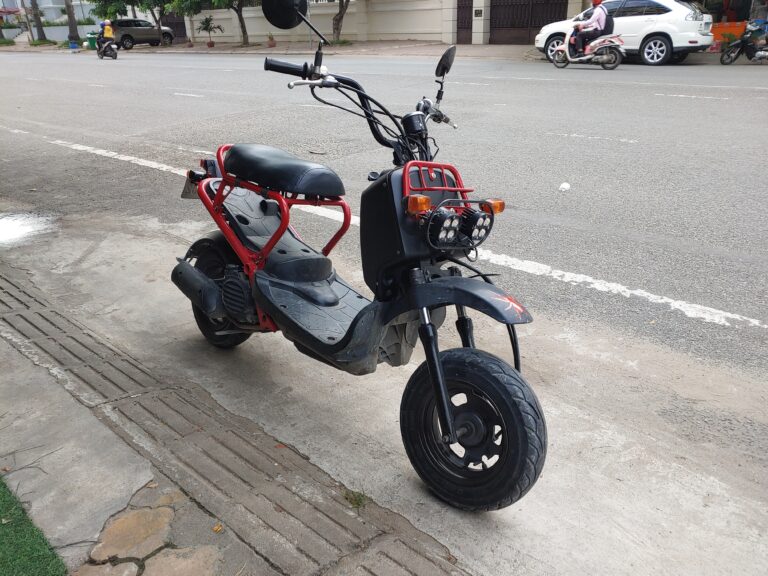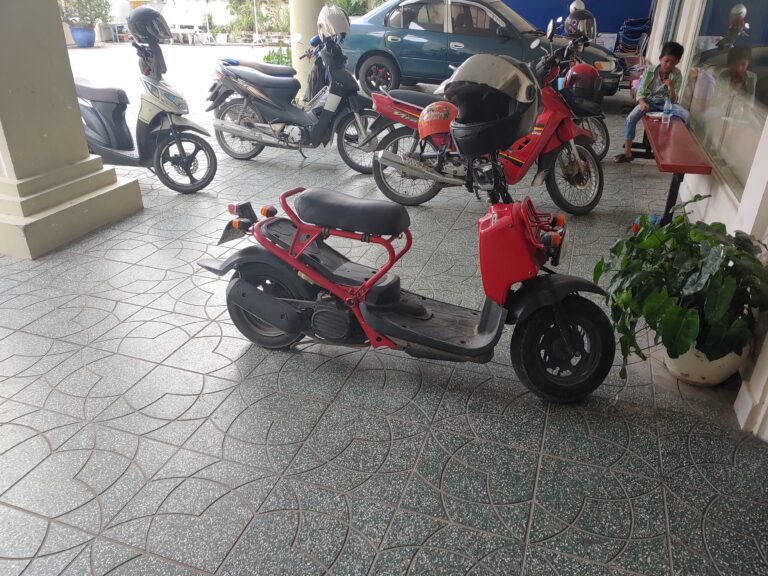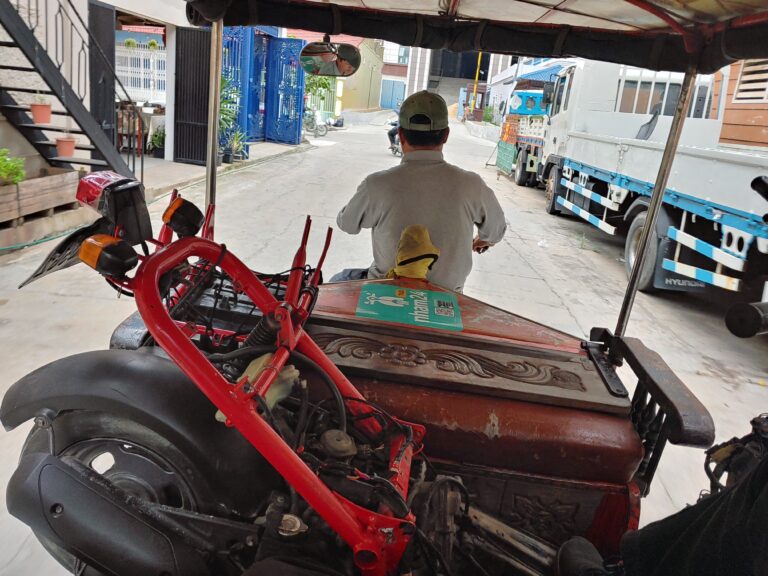Keep The Ruckus Down
By A.P. Ruckinson and Seth Zoomwyn
I got my first Honda Ruckus by somewhat dubious means. I had an acquaintance—a friend of a friend—who owned a very beaten up and sorry little Ruckus that looked like it had only barely survived being owned by a Russian. He was gigantic; I stand over 6 foot and he towered above me! He told me that he bought it because it was fun, and because where he came from—some part of California—they were popular around the town and he’d always fancied owning one.
Now, living in Cambodia, they were somewhat harder to find and he’d settled on the beaten-up one he had. It had issues, quite aside from the general appearance and condition of it. It was running poorly, coughing and spluttering and losing power as it rode along. He came to me out of desperation because I had a mostly unwarranted reputation for knowing a lot about bikes.
After some chin-scratching and poking around with a pointy-stick, we worked out that it was a failure of the fuel-pump and a new one got it running pretty nicely. It sat for some time in my yard waiting for him to collect it while he thought about updating it to something prettier.
At the time, my ex was going through some stuff. She was having mental-health issues of the worst possible kind and was behaving very irrationally. She took the bike, the ownership papers, and she vanished with it.
To say the least, the owner was not impressed, but he decided that he was equally unimpressed with the bike and had the budget to replace it with a later, newer and better one. I arranged to buy his bike and help him get a new one, so the police wouldn’t get involved. I was now stuck with a mostly broken Ruckus that was so ugly that staring at it made my eyes bleed.
When I finally got it back, I started going over it to see if there were any major faults. The first of them that sprung to mind was when I bounced the front end in the air and the entire suspension fell out, clattering on the floor.
After some repairs, it sat for several weeks until the traffic jams in my local area began to annoy me. A new road had opened up that would shave about 20 minutes of sitting in traffic off my journey, but the downside was that the road was unmade, muddy and rocky and wouldn’t be an easy ride on a normal scooter. I used the Ruckus one day and found it way, way more capable than I had thought. As I used it, I began to like it. I also liked the looks on people’s faces when they saw this bizarre, oddly utilitarian lump of ironmongery pass them by.
I sold it at one point, but only for two days. The buyer hated it and I regretted it, so I happily gave him his money back and got my Ruckus returned to me.
I used it solidly for a while before it eventually went completely underwater during a flood. I pushed it home through water up to the handlebars after it drowned in an unexpectedly bad storm. The next morning it actually turned over, spitting out water from the exhaust, and then spluttered and fired up. Sadly, it died very quickly after that and the beaten-up old engine finally gave up. Reluctantly I sold it cheap to a man intent on restoring it, because the cost of fixing it far outweighed the price of replacing it.
I had several other bikes in the meantime, small and large. I’m a motorcyclist at heart and my yard usually has several bikes in it, in various states of disrepair. But something deep inside me always missed that little scooter. They became slightly less rare, and every time I’d come across one, I’d smile and think about getting another one.
Eventually I got a bonus at work and decided I was going to squander the money on another Ruckus. There weren’t many for sale, especially in my price range, but I found a red one that seemed in relatively good condition for the price.
I test-rode it and it seemed almost exactly like my old one. It was in fairly good condition apart from a few marks here and there, but the rear suspension tended to bottom out pretty often.
I took her for a service, topping up the coolant, changing the oil and getting a new plug, but found that it still had a couple of relatively minor issues that needed ironing out. The low-fuel warning light was always on. I hadn’t noticed at first, but after topping up the petrol, it became clear there was a fault. When it rained, it would occasionally blow the main fuse, which killed all the electrical systems besides the engine, which apparently runs directly from the alternator.
With the electricals patched up, it ran perfectly well but did struggle a bit with the initial acceleration, although I thought that it was probably to be expected from a machine this small.
The first thing that needed sorting out was the suspension. I took it to my favourite mechanic and explained that the rear shock wasn’t strong enough and needed replacing with something at least 80% less useless. I was hoping he might be able to raise it up a little as well, and told him that if he could balance out the front, that would be good too.
I went to pick it up and was very pleasantly surprised that he had managed to install what was basically off-road suspension to the thing, making it now stand several inches taller than usual.
I took it out with my son on the front boards and we played around with it. I painted the battery cover, fitted far better LED headlights and made some other minor changes.
Then, the problems started.
Again.
Just like with my previous Ruckus, I got caught in a flood. This time the water barely got to the level of the floorboards but it was enough to get sucked into the airbox and flood the filter. It stopped the bike dead but she did manage to splutter back to life and drag us home, albeit at walking speed. After this, the bike ran horribly, she never got back full power and often cut out entirely.
Suspecting that this was all history repeating itself, I guessed that the pump had died. I took it to a roadside mechanic and told him to replace it.
Roadside mechanics in Phnom Penh are just untrained but experienced guys who work out of the front of their homes. They range anywhere from utterly clueless to at least halfway competent.
I didn’t mind swapping out the motor myself, but the hard part was finding one. The Ruckus is a rare bike but shares an engine and most internal components with the Honda Mini Scoopy, known as the Metropolitan in the US, and those are fairly common.
I picked it up from the mechanic, who I had used before, to be told he hadn’t swapped the motor but had cleaned the carb, fixed a broken hose and done something with the spark-plug. I got on and she ran horribly, not much better than before.



I gave him the benefit of the doubt and hoped it would run better once the automatic choke switched off. I ran it for several minutes and filled it with fresh fuel but nothing made any difference.
I gave up and decided to just do it properly myself. I stripped off the upper frame and removed the spark-plug. To my horror, I found that the plug had been forced in and had stripped the thread, rending the bike as dead as my hopes and dreams.
I am a fairly competent home mechanic but stripping the entire engine out and tearing down the head didn’t appeal to me at all, so I decided to take it into my favourite mechanic, the one who had built the suspension. He charges more but it’s usually worth it.
He got the head fixed and handed her back to me, and once again, it didn’t run. He assured me it was the auto-choke and, once again, I gave him (and the bike) the benefit of the doubt. As it was clear it wasn’t working, I was forced to return it.
I explored my options. I asked around to see what people thought I should do. Seth, always a stoic voice of cold, hard reason, said it would be best to cut my losses and throw it away. My wife also wanted me to get rid of it. A friend of mine in the US agreed, saying he would bin it and start over. Nobody I asked advocated keeping it.
I found another one near my house, a dark military-green one in excellent condition and for a very good price. I rode it and liked it,; it was smooth and effortless and ran nicely, almost silently as I opened the throttle to see what it would go like.
But my mind wasn’t made up.
My wife mocks me for this, but I tend to think of my bikes as small people. They have a character, they have a function, and they have their own personalities. I often give them girl’s names, further cementing the idea that they have some kind of identity.
My BMW round-the-world travel bike is called ‘Bella’ because it begins with the same letter and means ‘beautiful’ in Italian, and she was built in the Aprilia factory just outside of Milan. My Honda Varadero was known as Vinnie for reasons so convoluted that I really don’t want to get into it.
My motorcycles are usually things I’m passionate about. They’re machines that I’ve invested my interest in, have worked on and spent money and time getting them exactly how I wanted. I love my bikes.


But scooters are something else. I don’t generally feel anything for them; I just use them for sensible daily transport and only spend money when I have no choice about it.
It all seemed incredibly unfair, and I began to wonder about how people are often treated the same way. My motorcycles have value simply because they inspire emotion, but the bikes I have that are actually the most valuable, since they work the hardest, often don’t inspire me at all.
I started thinking about how this applied to humans and realised that I was more closely related to a motorcycle designed for commuting than I am to a big cruiser with polished chrome and a noisy exhaust.
Men often suffer at the hands of this attitude.
If you have ever been so low, so miserable, and so broken down by society that you watched ‘The Big Bang Theory,’ then there’s a parallel here to be drawn. The show centres around the relationship between a short, awkward scientist and a very attractive blonde woman. During the show, there are constant references to how she’s completely out of his league, how he’s punching above his weight, and how people are shocked that a woman like that would be interested in a man like him.
But once we look more closely, we see that the man is very hard-working, highly intelligent, has a well-paying job and is successful in his career. He is, by every measure, a good man. The woman, on the other hand dresses provocatively, makes bad decisions, works as a waitress while gripping onto a pipe-dream of being an actress, and constantly has to borrow money and food to survive.
And this is often the way we incorrectly apply value to things. When I spoke one of my friends who advocated getting rid of the Ruckus, and told him that in many ways, it’s the motorcycle equivalent of him, he changed his mind about the whole thing and thought I should keep it.
So I picked up the bike and decided to give her one more fair shot. This time, the mechanic had gone deeper than just repairing the broken cylinder head. He told me that he’d found wrong parts in the carb and many other problems, all caused by incompetent mechanics over the years.
Now she purred like a kitten, ran smooth, pulled much harder than ever before and performed like a totally different bike.
I made the right choice and ended up with a better scooter than I could have got by buying a different one. I now have a bike I’m happy with, a machine I trust, and I’ve saved an entirely competent machine from being scrapped.
As a Ruckus painted red, she’s now called ‘Ruby,’ and I treat her the same as any other two-wheeled vehicle I’ve owned.
Imagine if we actually treated people the same way.
Many thanks for reading this article. We hope it was interesting, informative and entertaining. Follow us on social media or share our content on your own pages. It helps us grow so we can create more free content for you.
